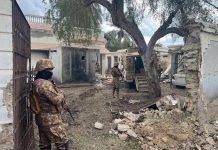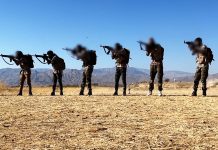Senior officials from Afghanistan, the United States and Uzbekistan on Wednesday held a virtual meeting on the situation in Afghanistan, and the three pledged to work together and address mutual issues of concern including political ties, security and economic and human development matters, Tolo News reported
The meeting was co-chaired by American Under Secretary of State for Political Affairs David Hale, Afghanistan’s acting Foreign Minister Mohammed Haneef Atmar, and Uzbekistan’s Foreign Minister Abdulaziz Kamilov.
Later on, the three countries issued a joint statement in which the three nations pledged to further expand their cooperation.
The first part of the joint statement reads that the three countries are “committed to greater cooperation among themselves” and call on countries of the region and the broader international community “to promote the Afghanistan peace process and to support the goal of a durable political settlement preserving the gains of the past 18 years to end the war in that country.”
The joint statement also welcomed the political agreement between President Ashraf Ghani and his election rival Abdullah Abdullah.
The joint statement says: “Welcomed the conclusion of the May 17 political agreement to form an inclusive Afghan government and to create a High Council for National Reconciliation, both of which should help move the peace process forward.”
The three envoys also urged the need to start intra-Afghan negotiations to discuss a comprehensive ceasefire and a political roadmap for Afghanistan’s future.
On the ceasefire, the statement said: “Welcomed the historic Eid ceasefire and the decision by Afghan leadership this week to expedite the release of Taliban prisoners, including the more than 900 prisoners released since that decision was taken, and urged the continued release of prisoners by both the Afghan Government and the Taliban consistent with the US -Taliban agreement of February 29.”
“Encouraged the continuation of the Eid ceasefire,” the statement noted, “the necessity of Afghanistan not returning to pre-ceasefire levels of violence and noted the urgency of eliminating civilian casualties in order to create an environment conducive for peace and delivery of essential life-saving services to fight the COVID-19 pandemic…”
The joint statement also “took note of the US-Afghanistan Joint Declaration and the US-Taliban agreement of February 29 and affirmed Taliban and Islamic Republic of Afghanistan commitments to prevent any international terrorist groups or individuals, including al-Qaeda and (Daesh), from using Afghan soil; to this end, the sacrifices of the Afghan National Security Forces and its international partners are greatly appreciated.”
“Consistent with the needs of our citizens, participants further agreed that the COVID-19 pandemic underscores the need to: strengthen cooperation to respond to public health crises, maintain flows of essential goods and services across borders, including critical medical supplies and foodstuffs, and respond to economic shocks,” the joint statement said.
Through the trilateral format, the participants intend to deepen cooperation through the following priority areas:
“Developing security cooperation and intensifying joint efforts to combat cross-border threats along the frontier between Uzbekistan and Afghanistan, and to address issues such as terrorism, drug and precursor trafficking, smuggling, illegal migration, human trafficking, and wildlife trafficking throughout the region.”
“Improving rail connectivity, including increasing the volume of freight transit traffic between Uzbekistan and Afghanistan and beyond, with a view to the uninterrupted delivery of food, essential goods, medications, especially in the context of the coronavirus pandemic, and improving regional transit integration.”
“Promoting trade between Afghanistan and Uzbekistan by reviewing and improving legal frameworks, policy reforms, sharing of information, use of appropriate technology, risk management, investment in infrastructure and human resources and removing constraints and bottlenecks, including through the development of the Free Economic Zone at the Termez border crossing.”
“Discussing the construction of railways linking Uzbekistan with ports in Pakistan and beyond, in particular, discussion of the feasibility of construction of railways along the Mazar-e-Sharif-Herat-Bahramcha and Mazar-e-Sharif-Kabul-Torkham routes.”
Mitigating the consequences of COVID-19 on food security;
The meeting also addressed supporting regional energy projects such as CASA -1000 (the Central Asia South Asia Electricity Transmission and Trade Project), Central Asia Regional Electricity Market (CAREM), multi-lateral development bank electricity transmission projects, the Turkmenistan-Afghanistan-Pakistan-India (TAPI) Pipeline, and the construction of the 500 kilovolt Surkhan-Puli-Khumri(Khoja-Alvan) power transmission line.
The statement mentioned: “Expanding opportunities for people-to-people exchanges and joint training, including at the Afghan Training Center in Termez.”
“Increasing humanitarian engagement between our peoples, including through coordination to confront the current pandemic, future public health crises, and natural disasters.”
“Promoting women’s equality and economic empowerment so that women can serve as drivers of the response to and recovery from the impacts COVID-19.”
“Establishing a working group to implement the decisions made under this trilateral.”






























